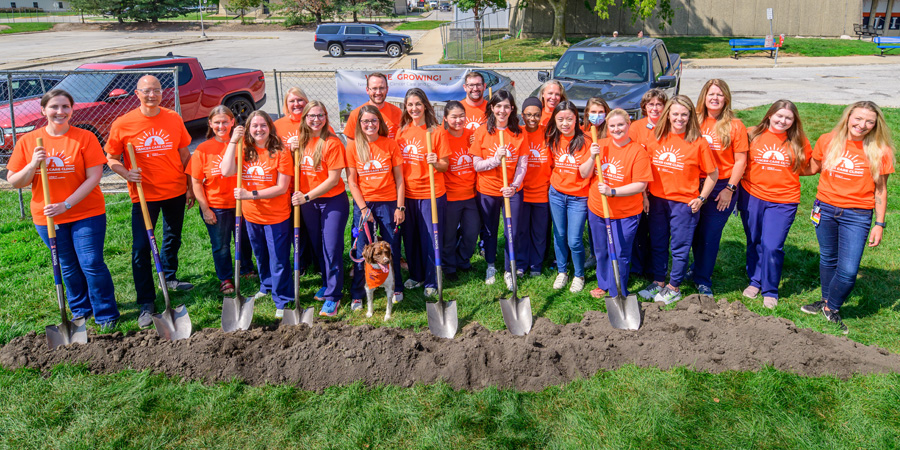This message will appear in the Illinois State Veterinary Medical Association Epitome.
You may know veterinary neurologist Dr. Devon Hague from her leadership roles in ISVMA and the Eastern Illinois VMA. I’d like to share some of her accomplishments in her new role at the University of Illinois College of Veterinary Medicine: associate dean for academic and student affairs
In August 2024, that position was vacated when Dr. Jonathan Foreman returned full time to his faculty role as professor of equine medicine. During his 17 years as associate dean for academic and student affairs, Dr. Foreman oversaw a 33% increase in class size as well as the transition to a curriculum that devotes significantly more time to clinical experiences. Through leadership roles at the American Association of Veterinary Medical Colleges, he also helped develop a framework and tools for Competency-Based Veterinary Education.
We are grateful for his years of service as associate dean.
Dr. Hague stepped into the role on an interim basis at first and was appointed to the position after a national search.
Additional Changes to the Student Affairs Team
There are two other new faces in the Office of Academic and Student Affairs: After the retirement of Alan Upchurch, Josie Clark was hired as the academic program coordinator. Drew McMullen became an office support specialist, joining Carol Parker. Stephanie Zoch was promoted to administrative aide.
Dr. Sara Connolly has taken on oversight of the admissions process, and her title has changed to assistant dean for admissions and student success. Taylor McCrory was promoted within the office to coordinator of admissions, working primarily with Dr. Connolly.
Dr. Hague and the ASA team have implemented many changes, starting with an expanded new student orientation. Transfer students now attend the Blue Coat ceremony and orientation, which has added a resource fair featuring campus services from financial aid to counseling. A streamlined student intranet site and a comprehensive student handbook have also been created.
Here for Students, Faculty, and You
Dr. Hague sees herself as a compassionate leader for students—providing a supportive environment and making expectations clear, explicit, easy to find—as well as for faculty—working with them to ensure effective management and delivery of the curriculum.
She also works closely with Illinois practitioners and alumni in her new role. For example, she learned that employers had concerns about the length of time it takes to get new graduates licensed in Illinois.
“This year we drove the forms to Springfield in hopes that might speed up” the process, she said. “With help from [ISVMA executive director] Debbie Lakamp, I am making connections within [the Illinois Department of Financial & Professional Regulation].”
Dr. Hague relies on Illinois practitioners to assist with several facets of student education. To help us assess outcomes of our DVM program, every year the college surveys employers of our graduates one and five years after graduation. This year, that means the classes of 2020 and 2024. We hope you will return the survey if you have hired a recent graduate or you graduated in those years.
Maintaining Accreditation Status
The AVMA Council on Education will make its next accreditation site visit to our college in spring of 2027, and Dr. Hague has a very long to-do list to ensure that our preparatory self-study document and the visit itself go smoothly.
Veterinary colleges must consider many changes as educational standards move to a competency-based framework. Dr. Hague feels confident about our program’s ability to measure up.
“Illinois has a really strong curriculum, with clinical access in all four years,” she says. “Our Clinical Skills Learning Center is one of the best in the nation, and Dr. Thomas Lowery, a 2008 Illinois graduate recently named director of the center, brings real-world production medicine and mixed animal practice to his role.”
Dr. Hague considers the center’s entire team—Sherrie Lanzo, Dr. Doreen Vaughn, Dr. Jessica Fleming, and Dr. Adrienne Coleman—“phenomenal.”
Preparations for the next accreditation visit include a faculty educational retreat in the fall focused on the AAVMC CBVE competencies.
Hosting Fourth-Year Students in Practices
Another change mandated by AVMA sets new standards for fourth-year clinical rotations that take place off campus. Veterinary practices that host students on these rotations can expect more information in the coming months.
“The expectations for both students and host practices will be more clearly defined,” says Dr. Hague. “We are looking to revise the evaluation form for supervising DVMs and providing more resources for partner practices.”
Around three-quarters of Illinois veterinary students spend part of their clinical year away from Urbana. Of the 355 off-campus rotations currently scheduled for the Class of 2026, 25% will take place in Illinois.
Dr. Hague has some advice for practices interested in hosting students: “A limiting factor for students is the cost of a place to stay during this elective. Practices that offer a housing allowance or a place to stay are greatly appreciated by students!”
Dr. Hague’s Philosophy
“Veterinary medicine is changing, there’s no doubt. How do we equip our graduates with the skills they need to be successful? One thing they need is to be nimble so they can navigate challenges,” says Dr. Hague.
Whenever practitioners tell her that the new graduate they hired doesn’t have a particular area of knowledge, she thinks back to an anecdote from her first days as a new veterinarian. She was an intern, the only DVM in the hospital on the overnight shift.
“After a couple of days, I went to my mentor and confessed: ‘Ohio State made a mistake in awarding me a degree,’ she recalls saying. ‘There are so many times I have to duck out of the exam room to look something up that I couldn’t remember.’
At this devastating revelation, Dr. Hague’s mentor just laughed.
“She told me that what I was experiencing was a very appropriate feeling to have.
“That was a pivotal moment for me. I realized that everyone is learning all the time, and it’s normal to have imposter syndrome. The important thing as a practitioner is to continue learning. And the important message to our students is letting them know the journey is never over.”
If you’ll be attending the ISVMA Convention in Oak Brook this November, please look for Dr. Hague. She welcomes your questions and comments on our students, graduates, and educational programs.




